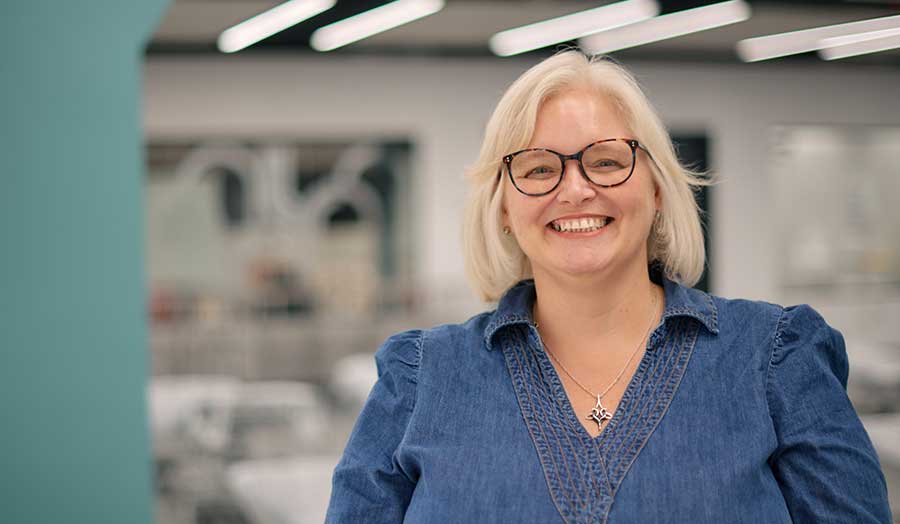Watch the interview with Julie
Dr Julie MacLaren, Head of Nursing, speaks with Communications Manager Ellie Campbell as part of our In Conversation With series.
“Every single patient I’ve nursed has left a little imprint on me”, reflects Dr Julie MacLaren, whose journey to Head of Nursing at London Met has not been without its challenges. Julie talks Ellie through how she found her passion within the profession, and what advice she’d give to her younger student self.
How did you enter the world of nursing?
I think I'd always wanted to be a nurse, and it started when I was really quite small. My grandparents were always in the hospital – they died fairly young. But you'd go in to visit them, and the nurses would make a fuss of you and they would give you an apron and a hat, and in the evening, you could help them give out the drinks. I remember that being something that really stuck with me. So, when I was making my choices at school, it was very much around, "What do I need to get into nursing?".
Coming to London from Bristol to study nursing was probably the best decision I ever made.
The human relationships were the first thing that got me, and it wasn't until later when I was doing my A-levels that I thought, actually, there's a whole academic side to this as well that really appealed to me.
All through sixth form I was doing part-time jobs – in a care home, in a holiday camp with MENCAP and working in a cash and carry – I’ve always been drawn to jobs where you get to talk to people and find out what makes them tick.
How did University prepare you to be a nurse?
You learn your communication skills – that's a really important part of nursing, in that you're never alone. Other people in the ward are there, and they all know what it's like – you're in this group of people who have a shared experience and can support you through.
You learn how to deal with patients that are less than nice, and you also learn how to debrief when something sad happens.
I worked in cancer and palliative care for quite a long time. There was one patient and we just hit it off, and we would just chat and make light of the day; she was moving to the last period of her life. I thought it was going to be really scary. I was with her, holding her hand when she died, and it was a really formative experience for me. I just thought, actually, I'm not frightened of this. I think I was prepared for it through what I'd done at university.
I think it’s a privilege to be with somebody in their last moments. It’s transformative – every single patient I've nursed has left a little imprint on me.
I graduated in 1991 and I’m still in touch with the people I trained with – we try and meet up every five years for a reunion, and it’s so lovely to see where everyone is in their career. We’ve got heads of nursing in the NHS, we’ve had people who’ve set up their own businesses, people working in health promotion. I really do think the friends you make at uni are the friends you have for life.
What are your memorable moments?
There are the joyous moments, like attending your first birth in maternity.
I also remember I was working in a cancer rehab ward, and I was working with a really lovely team, and we had some brilliant patients. There was a patient who had leg swelling that we were bandaging on a daily basis, and she was quite the artist. So one of the things that I really treasure that I've got in my front room at home is a little painting that she did of me, in my uniform, just rolling a bandage.
Do you have any words of wisdom for your younger self?
I think I would tell myself two things. Firstly, when I didn't get the A-level grades I wanted, I felt a bit dejected and I thought my dream was over. Looking back now, I would tell myself there is always a way. There's always a way to get to do what you want to do.
Secondly, I’d tell myself to be more confident. It’s only as I’ve progressed through my career that I’ve developed that sense of confidence – hopefully calm confidence to work with people.
Nursing is about respecting and valuing people wherever they’re from, wherever they’re going. Patients really do respond to the fact that you care about them.
What do you enjoy about working in education to help train nurses?
Your students almost become proxy patients – you’ve got to care for them and you’ve got to look after them. Clinical supervision is about helping students to develop resilience skills, to be able to recognise when things are a bit too much and they need somebody to talk to.
I think that it's really thrilling when you get to see people really blossom through their nursing training.
_
Find out more about London Met's Nursing (Adult) BSc course.

Nursing is about respecting and valuing people wherever they’re from, wherever they’re going. Patients really do respond to the fact that you care about them.
